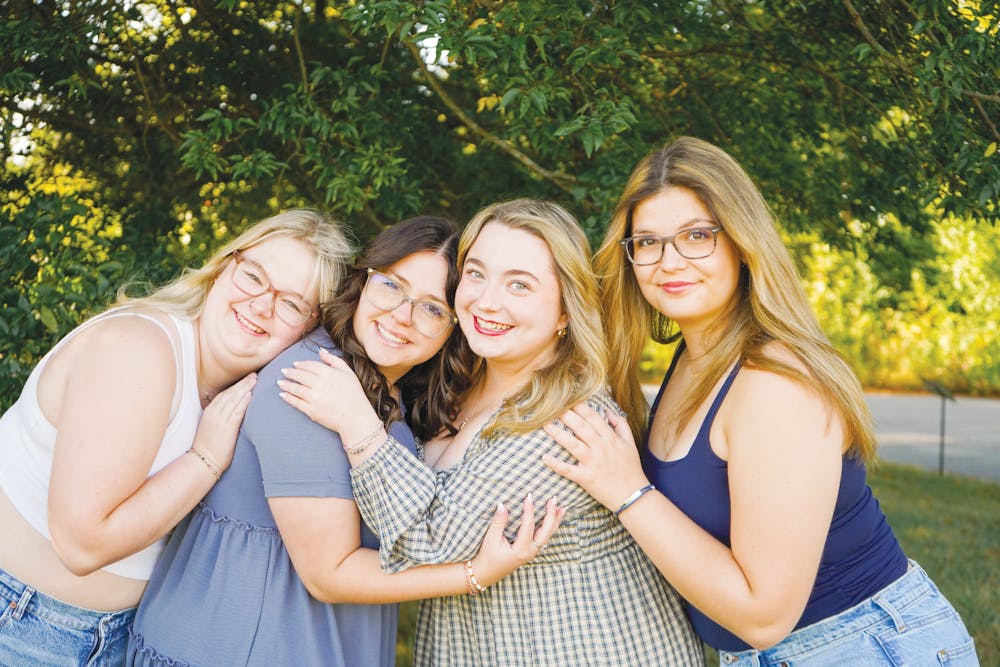Jessica Bergfors is a third-year journalism major and writes “The hope of it all” for the Daily News. Her views do not necessarily reflect those of the newspaper.
Tears brimmed my eyes as I dumped photos, necklaces and letters into an old shoe box. My heart dropped at every sound my phone would make; the lock screen of us smiling seemed unfamiliar now.
“I’m going to Vanessa’s house — Jaylin and Morgan will be there too,” I said to my mom.
Your first heartbreak can make you feel powerless and empty. I felt drained. When I was 18 years old, it seemed like my entire world came crashing down. Despite all the negative feelings, I still had some sense of stability. I never had to question whether or not my friends still loved me. I always knew the answer.
Growing up, I always had three girls by my side: Vanessa Winnick, Morgan Krouse and Jaylin Turner. Vanessa and I like to say that we’ve been friends since we were in the womb.
Our brothers went to the same elementary school, so when Vanessa and I were born seven years later, we were naturally always together. If you flip through one of my scrapbooks, dozens of photos of Vanessa and I exist there. Our bright blonde hair, baby blue eyes and matching cheerleading outfits made us look like sisters, and we were just as inseparable as sisters.
It was a warm summer night — one of those nights that everyone always longs for when it’s the dead of winter. The mosquitoes were biting and the fireflies flew past my small eyes. The outdoor lanterns cast a warm glow onto the dark red fence. Vanessa and I ran outside, and my dad took turns chasing us.
“She likes the White Sox!” I shouted at my dad.
He immediately started to chase Vanessa around the pool.
My dad was the biggest Cubs fan, hence my love for the Cubs to this day. He chased after Vanessa, who still is the biggest White Sox fan. Vanessa’s toothy smile and loud giggle rang in my ears as we were squealing and running away from my dad.
Now instead of hearing their loud laughs in person, I hear them over the phone. Vanessa and I are currently 253 miles apart. Distance doesn’t matter for us, though. If we could still stick with each other during our “figuring ourselves out” phases in middle school, a couple hundred miles is nothing.
According to the American Psychological Association, high-quality friendships in childhood can protect children from mental health issues. In the United States, many adults struggle with a variety of challenges, and friends are usually the people they lean on for support.
My female friendships continue to shape me and my life. Three years ago, I came to Ball State knowing absolutely no one.
On one of the first nights in the dorm, my new neighbors were so loud that I banged on the wall next to my bed, trying to signal them to be quieter without a confrontation. A minute later, there was a knock on my door, and on the other side was a brown-haired, glasses-wearing girl, apologizing for the inconvenience.
I didn’t know it at the time, but this brown-haired girl would later become one of my best friends and my current roommate.
Maria was one of my first friends at Ball State. Through her, I met my other close friend, Layla. Our group continued to grow as we all made friends with each other’s friends — many of whom also lived on the same residence hall floor. Consisting of mostly girls, with the exception of our friend Brenden, our friend group made me feel safe in this time of change.
According to Psychology Today, research suggests that women expect more support and intimacy in their relationships than men. Findings from the Survey Center of American Life show that 48 percent of women say they had a private, intimate conversation with a friend where they talked about their personal feelings in the past week, compared to only 30 percent of men.
Lucky doesn’t even encapsulate the feeling, but I am. I’m beyond lucky.
I have friends who I can call because I’m having a bad night, so they take me to Culver’s for ice cream. I’m able to come back to my room and rant to Maria about my day, never feeling judged. My closet is treated like an American Eagle store, with everyone taking their pick when we’re going out. We can go on drives and belt out Taylor Swift songs together.
When I’m upset about a boy, I can call Elizabeth saying, “Are you home? Can I come over?” I can text Layla that I’m feeling sick and she brings me three different kinds of medicine with a sticky note saying, “Feel better!” on my desk.
Simple messages like “Text me when you’re home,” “You look cute today,” “I love you” and “Let’s do dinner tonight?” are something that I never hear the end of, and I never want to.
In the book I read this summer, “Everything I Know About Love,” Dolly Alderton said, “Nearly everything I know about love, I’ve learned in my long-term friendships with women … I know what it is to know every tiny detail about a person and revel in that knowledge as if it were an academic subject.”
My female friendships have taught me true love and have made me the woman I am today. When I’m older, I hope to have a daughter who I can teach these things to.
I hope to have a daughter who I can show all the handwritten letters, the digital camera photos and matching bracelets. I hope to teach her about the strong, passionate, empathetic women who have permanently altered my life.
Contact Jessica Bergfors via email at jessica.bergfors@bsu.edu.





